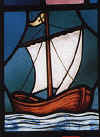- Lesson
1
- People
of Hope
- Luke
1:1-80
Luke begins
his story of the extraordinary
Christ by introducing some
very ordinary people. They
live in a small, second-rate
country occupied by imperial
Rome. It is around 4 B.C. For
over 400 years their nation,
Israel, has heard no prophetic
voice from God.
Has God forgotten his chosen
people? Has he left them to be
the perennial pawns of
aggressive neighbors? Is he
going back on his many
promises to send his Messiah
to save them?
No. God is about to break into
Israelís dark history with
new light, and he chooses to
do this through an elderly
childless couple and a
teenaged village girl.
1. How do you feel on a
committee or in a group when
you are part of a hopeful
minority among pessimistic
people?
2. Luke opens with an event
that bridges the Old Testament
religion to New Testament
Christianity. As you read Luke
1:1-25, note the references to
that older religion. In what
ways do Zechariah and
Elizabeth show that they still
hope in the God of Israel?
3.Gabriel announces some
astounding facts to Zechariah
about his son who is to be
born (vv. 11-17). Do you find
yourself sympathetic or
critical of Zechariahís
response of unbelief (vv.
18-22)? Explain.
4. The circumstances of the
birth of the Messiahís
forerunner were to be most
unusual. Why do you suppose
God planned it this way?
5. Read Luke 1:26-56 for
Gabrielís second birth
announcement. How is it even
more extraordinary than the
first?
6. Like Zechariah and
Elizabeth, Mary also hopes in
God. She accepts Gabrielís
message more readily than
Zechariah did. Which would you
find easier to believeóa
promise from God through an
angel or a promise through the
Bible? Why?
7. The visit to her cousin
Elizabeth bolsters Maryís
faith for the stupendous event
to come. As expressed in her
song of response, what kind of
God does she believe in (vv.
46-55)?
8. Read Luke 1:57-66. Note the
effects of Johnís birth on
neighbors and relatives. What
might be Lukeís purpose in
describing their response in
such detail?
9. Read Luke 1:67-80. In
Zechariahís inspired
prophecy he sees (1) the great
acts that Godís Redeemer
will do (vv. 68-75), and (2)
his childís unique relation
to this Redeemer (vv. 76-79).
Suppose you were one of
Zechariahís neighbors or
relatives listening to him.
Which part would have stirred
you as a devout Jew? Explain.
10. Zechariah and Mary
expressed their hope in God
differently. What in their
interaction with God gives you
hope as you also seek to trust
God totally?
|

